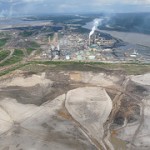
Alberta Tar Sands
It is conventional knowledge that oil is a non renewable resource made over 100 million years ago through the decomposition of small animal and plant life. These deposits are not spread evenly over the globe and in a number of key locations supplies have peaked and are on a permanent fatal decline. Take our second largest exporter Mexico, the Cantrell field peaked in 2004 and is showing a 17 percent decline. The United states also peaked in 1972 and now produces just 35% of what it did during peak production and this trend can be seen in 40 other countries globally. While there have been a number of large oil field finds over the last couple of weeks in Brazil and the Gulf of Mexico, these fields are not the cheap easy to access oil fields but located deep in the ocean and under incredible pressure.
The future of oil is scarcity, and the high price of oil today even during the most severe economic recession since the great depression has kept prices hovering around $70 dollars a barrel. Major oil companies have now found it profitable to extract poor quality and high carbon oil in the form of tar sands. One of the largest fields under development is in Alberta, Canada which expects to unearth an area the size of Florida. The dirty little secret behind tar sands is that it is a highly toxic process that abuses water supplies, destroys forests, contaminates the water tables of local communities, and is more carbon intensive than conventional oil.
In the latest report by the Cambridge Energy Resource Association (CERA), it is expected that by 2010 oil demand will rise again with the recovering economy. While there has been quite a bit of contraversy about when Peak Oil should hit the global economy, it has become apparent that since 1960 we consume about 3 barrels of oil for every 1 we find. Many of the optimistic views on oil supply from industry is based on potential arctic supplies, now close to becoming a reality with the arctic passage open for the first time. It is critical that we find ways to drastically ramp down our consumption of oil and explore alternatives to this high energy commodity, not only because of climate change, air pollution, and environmental degredation, but to protect our economies from future potential price spikes due to the inevitable scarcity of oil and other non renewable resources.
